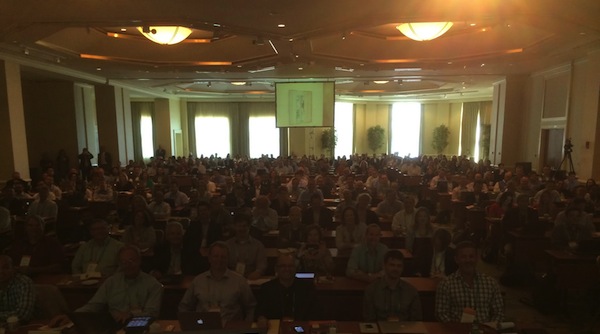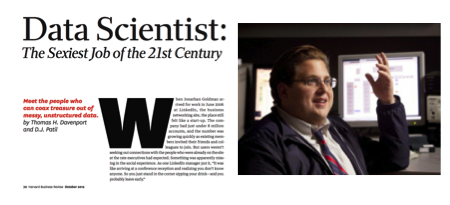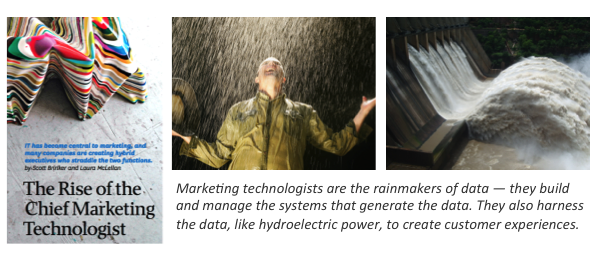
As this post goes live, the inaugural MarTech conference will have started. About 400 of you are here at this sold out event — and let me say, I am thrilled to be here with you. For the rest of you, I wish you were here — and I’d like to share with you my opening remarks for the event, marking this milestone in our emerging profession.
I started this blog over six years ago, just as a labor of love. As a software entrepreneur building products for marketers, I was fascinated by how technology was changing the marketing department — the kinds of work it did, the kinds of people who did that work, and the growing impact this had on business outcomes.
In my first blog post, I did a search for the phrase “chief marketing technologist” and got back only 345 matches. Last week, I did that search again — and 276,000 results came back. That’s growth of three orders of magnitude! And while that’s not a perfectly scientific metric, I believe it’s representative of the growth in this hybrid discipline.
It wasn’t that many years ago that the term “marketing technologist” would have been considered an oxymoron. Marketing? Technologist? Those two things don’t go together! It was right up there with classic oxymorons like jumbo shrimp, living dead, and romantic comedy. (My wife says that last one isn’t an oxymoron, but I disagree.)

Or “science magic.” There’s an oxymoron. Although, now that I think about it, science magic kind of perfectly describes what we do with marketing technology, doesn’t it?
Yet in context, of course, oxymorons aren’t really contradictory at all. A jumbo shrimp isn’t a Godzilla-sized crustacean. It’s simply large compared to other shrimp. A marketing technologist is simply someone who manages technology in the context of marketing. And while that was a pretty narrow context for most of marketing’s history, it’s exploded in the past several years.
A headline in AdWeek last month captured the state of marketing today: CMOs Are Preparing for Digital to Grow to 75% of Marketing Budgets. Digital has taken over marketing. And, as we know, everything digital is controlled by software. By transitive logic — marketing = digital = software — marketing has become a software-powered discipline. Even traditional marketing channels are orchestrated behind the scenes by software.
A couple of years ago, Harvard Business Review published an article by Thomas Davenport and DJ Patil, Data Scientist: The Sexiest Job of the 21st Century.
In a world of near infinite data, professionals who can fish out insights from the ocean of data we’re drowning swimming in are incredibly attractive. Yes, Jonah Hill in Moneyball is a sex symbol of 21st century business.
But fast forward to this summer, two years later. Harvard Business Review published a new article about a rising star in the digital world — The Rise of the Chief Marketing Technologist. And while I’m clearly biased, I think this is a far sexier position. Why?
Because when it comes to data, marketing technologists are the rainmakers. They build and operate the systems that generate all this data — determining the quality and relevance of that data. They also build the systems that harness this flood of data, like hydroelectric power, and turn it into customer experiences. That’s science magic.
And who is the face of this new profession? You are.
For a while, you know, people have been claiming you don’t exist. A technologist who understands marketing? A marketer who understands technology? Good luck finding such unicorns! Well, we seem to have found nearly 400 here. I joked in a post a month ago that MarTech might as well be dubbed the Festival of the Unicorns.
Chris Elwell, the producer of MarTech emailed me to suggest that we have t-shirts with unicorns on them printed up for attendees. I appreciated the thought, but I was a bit worried that it might be like that scene in Dodgeball — a true classic of American cinema — where Vince Vaughn walks into the apartment with all the unicorns. A little awkward. I thought the unicorn t-shirts might be better suited to my six-year-old daughter’s birthday party.
But then Chris emailed me this drawing of a bad-ass unicorn.
Of course, there’s an Internet meme for this.
Actually, I kind of like it. Marketing technologists are bad-ass unicorns.
Yet the truth is that we’re rapidly moving beyond the unicorn metaphor. When mainstream business publications such as Harvard Business Review and the Financial Times cover your profession, you’re not that rare of a creature. When mainstream business books, like The Performance Marketing Blueprint by Paul Roetzer, recommend hiring a marketing technologist as a “best practice,” you’re not a myth. When recruiting agencies start publishing salary data on you and rank “chief marketing technologist” as their top placement for 2014, you’re no longer in the realm of folk lore.
Entrepreneur Magazine now talks about how Modern Marketers Need to Speak “Engineer.” First Round Capital recently published a blog post, The Case for Why Marketing Should Have Its Own Engineers. There are many more examples, but you get my point: marketing technologists are tipping from mythical to mainstream.
You are the trailblazers. You’ve innovated these roles ahead of the curve. But increasingly, you’re not alone at this fascinating intersection, and you’ll be leading a whole generation of marketing technology professionals that will follow in your footsteps.
I believe this conference marks that tipping point.
Credit to the people who made this possible
Let me take a moment to recognize the people who have made this conference possible. First, Third Door Media, the producers of MarTech. Chris Elwell, Danny Sullivan, and their team did all the hard work of bringing this conference together. I got to do the fun stuff with the program, while they wrestled all the logistics and operations. Third Door also produces SMX, the leading search marketing conference series, and publish the popular sites Search Engine Land and Marketing Land. Danny Sullivan pioneered the search marketing industry, and I’m incredibly honored to be doing this with him and his team.
One of the things that brought us together is a shared set of values around producing a conference. That what matters more than anything is your experience as an attendee — we want it to be a great one. Plus a firm belief in the separation of church and state — our program was developed completely independent of our sponsors. There was no pay-to-play for speakers. No native advertising on this stage. John Oliver would be proud.
However, we do have some amazing sponsors who have made this event possible. Brightcove, IBM, Invoca, and SnapApp will be giving separate, sponsored presentations over lunches today and tomorrow. Bright Funnel sponsored last night’s reception, Vidyard is sponsoring tonight’s. DataXu, Intelisent, Allocadia, Bizo, Ensighten, InMotionNow, NetProspex, Tealium, and TrackMaven are our other sponsors and exhibitors, and I hope you’ll check out the marketing technology innovations that they’re delivering.
On the content side, I want to thank our incredible board of advisors: Eduardo Conrado, Jane Hiscock, Terence Kawaja, David Raab, Virginia Sharma, Mayur Gupta, and Sean Ellis — all rock stars in our industry — who lent their support to the creation of this conference and offered invaluable guidance in its programming.
And enormous thanks go to our speakers: Mayur Gupta, Laura McLellan, David Raab, Paul Roetzer, Jascha Kaykas-Wolff, Erica Seidel, Jane Hiscock, Wes Hunt, Lisa Ritchie, Travis Wright, Erik W. Holt, Lou Pelosi, David Humphreys, Erik Brynjolfsson, Sheldon Monteiro, Sheryl Pattek, Jason Heller, Sean Ellis, Christopher Penn, Shawn Goodin, Michael Krigsman, Vala Afshar, Don Schuerman, Steve Mann, and Dharmesh Shah. They’re all at the top of their game in the topics they’ll be presenting, and I am so immensely grateful for their contribution.
Above all, I want to thank those of you who are attending MarTech. It’s such a rush to be in the room with hundreds of other pioneers at the intersection of marketing and technology. Thank you for making the journey to be here. This conference was made for you.
If you wanted to come, but couldn’t make it, I hope you’ll consider joining us for the next MarTech in the spring, March 31-April 1, in San Francisco. In the meantime, keep an eye out on the #MarTech hashtag.
Get chiefmartec in your inbox
Join 42,000+ marketers and martech professionals who get my latest insights and analysis.



